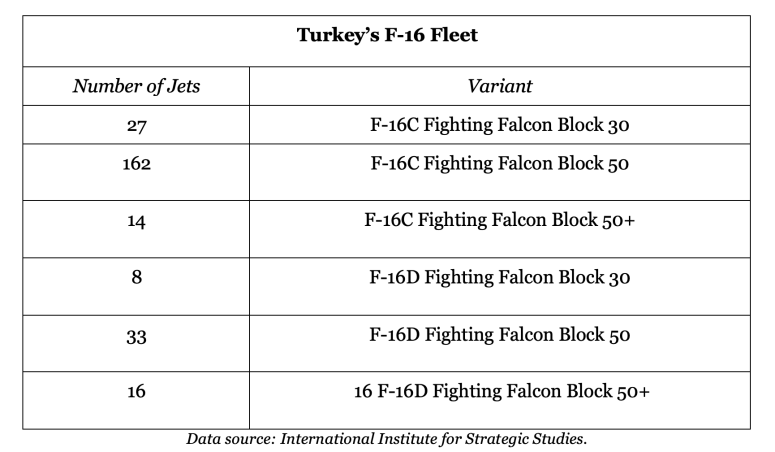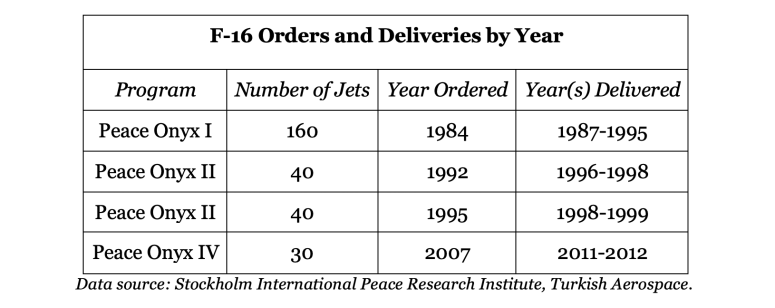
F-16 Sales to Turkey, Human Rights and Regional Peace
A proposed sale of 40 F-16 fighter jets and 80 modernization kits to Turkey has become a contentious issue in Washington, dividing Congressional leaders and the Biden administration.
“Turkish and Turkish-backed forces have utilized American-made weaponry and components during these incursions to commit war crimes, including purposefully bombing civilian targets like hospitals and schools in Iraq, Syria, and Nagorno Karabakh,” warned a February letter signed by a bipartisan group of more than 50 members of the House of Representatives.
“The purchase of advanced fighter jets from the United States for Turkey’s military arsenal will not incentivize Erdogan to change course and become a good actor. It will more likely lead to further death and destruction in the region at the hands of his military,” the letter continued.
It called on the United States to “not provide any further support to Turkey’s military until President Erdogan takes tangible steps to halt his destabilizing actions and violations of international law at home and abroad.”
The Biden administration, by contrast, is supportive of the sale. Unlike Congress, its position does not address how Turkey uses the F-16s it currently possesses. It instead has focused on NATO and the war in Ukraine.
“There are…compelling long-term NATO alliance unity and capability interests, as well as U.S. national security, economic and commercial interests that are supported by appropriate U.S. defense trade ties with Turkey,” stated an administration response to the February letter.
This is not the first time that a Democratic president and State Department have clashed with Congress over major arms sales to Turkey—and history has proven Congressional critics of Turkish use of American weapons to be justified.
In 1995, Human Rights Watch found troubling failures on the part of the State Department to fully investigate Turkey’s use of U.S.-origin weaponry, including F-16s and other combat aircraft, in violations of the laws of war—despite being ordered by Congress to investigate these incidents.
Continued U.S. arms transfers to Turkey since that time have strengthened the most authoritarian and nationalist elements of the Turkish state and insulated Turkey from being forced to address the political roots of its Kurdish conflict. Turkey continues to use its U.S.-origin weaponry in escalating military campaigns that have killed and displaced civilians and caused chaos in the region.
These arms transfers have not prevented Turkey from taking actions directly contrary to the interests and priorities of its Western allies, from hindering the counter-ISIS campaign to blocking NATO accession for Sweden and Finland as an active war wages in Europe.
To promote peace, stability and human rights in the region, pursue accountability for abuses, and avoid rewarding Erdogan’s autocracy for destabilizing behavior, the Biden Administration must reconsider its support for the F-16 sale. Congress must use its authority to block the sale and initiate a comprehensive investigation of how Turkey uses its F-16 fleet.
American Companies Built Turkey’s F-16 Program with Taxpayer Funding
The Turkish Air Force is heavily reliant on U.S.-origin equipment, and F-16s are its centerpiece. According to the International Institute for Strategic Studies, Turkey currently possesses 260 F-16s, out of 306 combat-capable aircraft in total. These F-16s are organized into eight fighter/ground attack squadrons, one intelligence, surveillance, and reconnaissance squadron, and one training squadron.

Turkey began the process of acquiring its first F-16s in 1984. The United States and Turkey co-produced these jets through a program known as “Peace Onyx.”

This program involved collaboration between US-based F-16 producers General Dynamics and Lockheed Martin and Turkey-based Turkish Aerospace Industries, a Turkish state-affiliated defense company that also had American shareholders until 2005. It was largely funded by U.S. security assistance programs. Support also came from Saudi Arabia and Kuwait.
The Federation of American Scientists warned in a 1999 report that the co-production program served to “enhance the economic power of Turkey’s military elite, which in turn increases their already considerable political clout.”
The U.S. Downplayed Atrocities to Press Forward with F-16 Sales
The United States ignored realities on the ground, explicit warnings from human rights organizations and direct orders from Congress in order to build Turkey’s F-16 fleet—going so far as to downplay the country’s use of F-16s to kill its own people.
Most of Turkey’s F-16s were delivered to the Turkish Air Force in the first 15 years of the war between the government and the armed Kurdistan Workers’ Party (PKK), when abuses by state forces—including village demolitions, forced displacement, extrajudicial killings, torture, and enforced disappearances—were at their peak.
In 1994, Congress mandated that the State Department produce a report on Turkey’s use of U.S.-origin weaponry in these systemic rights abuses.
The report, which was released in June 1995, cited one case of an alleged Turkish war crime involving F-16s:
“In March 1994, all major Turkish dailies reported that Turkish warplanes had bombed a village in Sirnak province in southeastern Turkey. On March 31, the TDN carried a follow-up story stating that at least 4 villages were bombed and at least 20 civilians killed. The GOT denies that this raid took place but USG personnel have determined that raids did take place and that some civilians were killed…”
— U.S. Department of State, Report on Allegations of Human Rights Abuses by the Turkish Military and on the Situation in Cyprus, June 1995.
The State Department knew that civilians had been killed. It also knew that the Turkish government intended to cover up the deaths.
Yet rather than investigate further or seek out evidence of other similar attacks involving F-16s, as they had been ordered to by Congress, the State Department concluded that the U.S. government was “unable to determine all the circumstances surrounding this incident” and did “not have information regarding the extent to which U.S. equipment has been involved in village evacuations and/or destruction more generally.”
Months later, a groundbreaking Human Rights Watch investigation found that this report was “marred by a series of systematic flaws and contradictions” in order to “facilitate the policy of continued military sales to Turkey.”
Human Rights Watch was unequivocal about the impact of U.S.-origin combat aircraft in Turkey’s Kurdish conflict:
“The Turkish Air Force has been implicated in a number of severe violations of the laws of war, primarily in the indiscriminate or disproportionate use of bombs against civilian settlements. Although indiscriminate bombing by Turkish combat aircraft is not the most common violation of the laws of war by Turkish security forces, the sheer power of the planes is such that those violations that do occur cause large numbers of casualties.
Turkish Air Force fighter-bombers, most of which were supplied and equipped by the U.S., have been used to attack villages and to kill civilians. In other instances, the planes have been used to destroy civilian structures, contributing to the general process of forced dislocation.”
— U.S. Department of State, Report on Allegations of Human Rights Abuses by the Turkish Military and on the Situation in Cyprus, June 1995.
They also investigated the March 1994 strikes in Sirnak in greater detail than the State Department had. What they found was indisputable evidence of a massacre:
“On March 26, 1994, according to five witnesses interviewed by Human Rights Watch, two Turkish fighter-bombers dropped four large bombs on the village of Kuskonar…in Sirnak province. The bombs were dropped after a helicopter overflight and after the fighter-bombers made an initial dry run over the village. There is little question, therefore, that the bombing was deliberate…
…Two of the bombs landed directly in the middle of the village, then inhabited by about 150 civilians. Twenty-four villagers were killed, including twelve children aged fifteen and under. Seven of the bodies were so badly mangled they were unrecognizable except for the remaining shreds of clothing. The reasons for the bombing remain unclear. According to witnesses, there were no PKK fighters in the village at the time of the bombing, but for several days prior to the attack villagers had been under intense pressure from the government to join the village guard system, and there is also some indication that the villagers were planning to boycott the local elections, scheduled for the following week. According to the U.S. State Department, the Turkish authorities denied responsibility for the raid when asked; the U.S. government said in its June 1995 report to Congress, however, that its personnel “have determined that raids did take place and that some civilians were killed.”
— Human Rights Watch, Weapons Transfers and Violations of the Laws of War in Turkey, November 1995.
A 2013 European Court of Human Rights (ECtHR) ruling on the bombings proved the version of events put forward by witnesses and local NGOs right— and showed the degree to which the U.S. failed to investigate these attacks.
The ruling found the government of Turkey responsible for the deaths of 33 victims and ordered them to pay restitution to the families.
Central to the case was the discovery of a Turkish flight log for March 26, 1994. It proved that two F-16s, as well as two U.S.-origin F-4 jets, had flown missions ten nautical miles to the west and north-west of Sirnak—the area where the targeted villages of Kuskonar and Kocagili were located.
The ECtHR ruling also revealed that the government of Turkey had withheld this flight log from the court and had instead falsely claimed that the villages in question were bombed by the PKK.
The 1995 State Department report shows that the United States was aware that civilians had been killed by aerial bombardment in Kuskonar and Kocagili. The U.S. government should have been able to use its close relationship with the Turkish military to access the flight log, confirm that U.S.-origin jets were used in the strike, and directly refute Turkey’s denial of responsibility for a clear war crime.
The fact that it did not do so is a glaring example of the “understatement of the role of U.S. weapons in the Turkish village eradication campaign” and “failure to provide original investigative findings” for which Human Rights Watch criticized the State Department report.
Turkish Airstrikes Still Contribute to Displacement, Harm Civilians
Turkey continues to carry out airstrikes that kill and injure civilians, contribute to mass displacement, and destabilize the region. Simply because of the Turkish Air Force’s inventory, it is all but certain that F-16s were used in many of these strikes, though the use of drones is becoming more common.
Perhaps the most infamous is the Roboski Massacre, where more than 30 civilians—all of whom were citizens of Turkey, most of whom were children—were killed in Uludere, Sirnak in a December 2011 strike on a border trading convoy. Turkish media and international rights monitors revealed that the strike involved two F-16 jets. The perpetrators have not been held accountable, and families of the victims have faced legal prosecution for advocating for justice.
Monitor Airwars estimates that between 716 and 1,163 civilians in Syria and Iraq have likely been killed in Turkish military actions, including air and artillery strikes, since 2015. They estimate that 1,635–2,222 civilians have likely been injured by such actions during the same time period.
Hundreds of thousands of people across both countries have been displaced by Turkish bombing during that time period.
A July 2020 report on Turkey’s invasion and occupation of Afrin from the Ceasefire Centre for Civilian Rights found that “the Turkish military appears to have repeatedly struck homes and residential areas without warning, leading to significant civilian deaths, injuries and property damage.”
They cited strikes on civilian targets on eight separate days that were reported to have killed between 101 and 123 people during the operation.
A 2021 report on Turkey’s Operation Claw-Lighting in northern Iraq published by local NGO Community Peacemaker Teams warned that “while Turkey claims to target the PKK in Operation Claw-Lightning, the reality is that civilians living in the border regions are most critically impacted by Turkey’s bombings.”
The report found that more than 1,500 people had been displaced between April and September of that year. Three civilians were killed in Turkish bombardment, and 12 were injured.
How to Break the Cycle
The United States holds some responsibility for this ongoing pattern of abuses. The U.S. failure to investigate and respond to Turkey’s use of its first batch of F-16s in the 1990s is an important part of why.
A total of 110 F-16s were delivered to Turkey after 1995, although the U.S. knew at the time that the government of Turkey had used these jets to kill and displace its own citizens and then covered up its actions.
If war crimes like the bombing of Kuskonar and Kocagili had been investigated in full when they occurred and information about the use of F-16s in indiscriminate bombardment and village demolitions had been provided to Congress, it is possible that further action may have been taken to block F-16 sales and other arms transfers.
Deprived of U.S. military equipment, the Turkish government may have been forced to address the political and social root causes of conflict in its country. It may then have sought a negotiated settlement with the Kurdish movement—a move that could have saved countless lives and prevented regional crises that threaten international interests today.
With this history in mind, the Biden Administration’s willingness to ignore Congressional concerns about Turkey’s use of U.S.-origin weaponry to promote the sale of a specific system known to have been used in serious rights abuses is concerning.
If previous trends hold, moving forward with the sale is likely to embolden Turkey to continue its aggressive policies in Iraq and Syria. Turkey will use its new F-16s in the same way as it uses its current fleet, with the same deadly consequences for civilians.
Erdogan will receive a domestic political boost going into the 2023 elections, in which he seeks to consolidate power even further. He will present the sale not as an opportunity for cooperation between Turkey and its allies, but as a victory for Turkey over the United States.
In order to promote peace and human rights in the region and counter Turkey’s destabilizing, interventionist policies, the Biden Administration should instead:
- Cease support for the proposed sale of 40 F-16s and 80 modernization kits to Turkey.
- Continue to both publicly and privately oppose further Turkish military action in Syria; and both publicly and privately oppose Turkish military action in Iraq.
The U.S. Congress has a stronger record on human rights in Turkey and regulating Turkey’s use of U.S. arms and security assistance than the executive branch does. Drawing on its previous efforts, it should:
- Use available avenues to block the sale of F-16s, any other combat aircraft, and any related technology or equipment to Turkey.
- Mandate that the U.S. government produce a comprehensive report on Turkish use of F-16s and other U.S.-origin combat aircraft in a) violations of the laws of war and b) actions that displace civilians and threaten security and stability in Iraq and Syria.
Correction: A previous version of this report incorrectly cited the Airwars dataset on the number of likely civilian deaths in Turkish military actions in Iraq and Syria as at least 1,500. The more accurate range in the Airwars dataset is between 716 and 1,163 likely civilian deaths due to Turkish military actions in Syria and Iraq.




